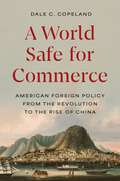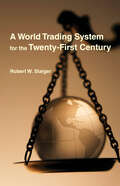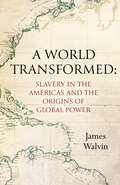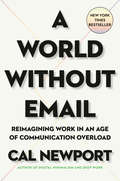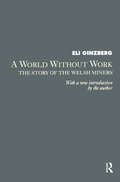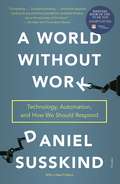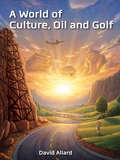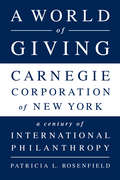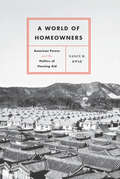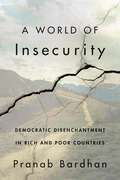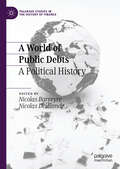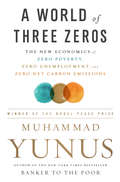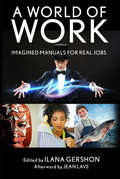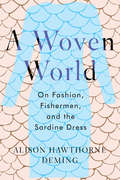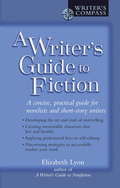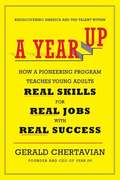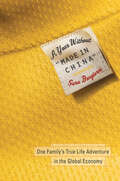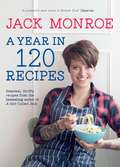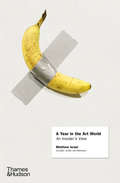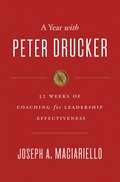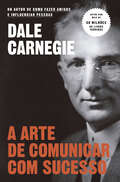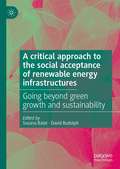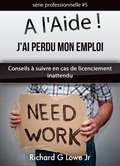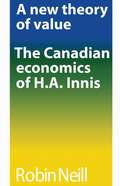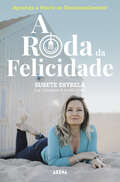- Table View
- List View
A World Safe for Commerce: American Foreign Policy from the Revolution to the Rise of China (Princeton Studies in International History and Politics #210)
by Dale C. CopelandAn Economist Biggest Book of the YearHow commerce determines whether America preserves the peace or goes to warWhen the Cold War ended, many believed that expanding trade would usher in an era of peace. Yet today the United States finds itself confronting not just Russia in Europe but China in the Indo-Pacific, Africa, and Latin America. Shedding new light on how trade both reduces and increases the risks of international crisis, A World Safe for Commerce traces how, since the nation&’s founding, the United States has consistently moved from peace to conflict when the commerce needed for national security is under threat.Dale Copeland shows how commerce pushes the United States and its rivals to expand their spheres of influence for access to goods even as they worry about provoking a breakdown in trade relations that could spiral into military conflict. Taking readers from the wars with Britain in 1776 and 1812 to World War II and the Cold War, he describes how America&’s leaders have grappled with this inherent tension, and why they have shifted, sometimes dramatically, from peaceful, mutually beneficial policies to coercion and force in order to increase control over vital trade and prevent economic decline.A World Safe for Commerce reveals how trade competition could lead the United States and China into full-scale confrontation. But it also offers hope that both sides can work to improve their overall trade expectations and foster the confidence needed for long-term peace and stability.
A World Trading System for the Twenty-First Century (Ohlin Lectures)
by Robert W. StaigerWhen designing a world trading system for the twenty-first century, &“Keep calm and carry on&” beats &“Move fast and break things.&”Global trade is in trouble. Climate change, digital trade, offshoring, the rise of emerging markets led by China: Can the World Trade Organization (WTO), built for trade in the twentieth century, meet the challenges of the twenty-first? The answer is yes, Robert Staiger tells us, arguing that adapting the WTO to the changed economic environment would serve the world better than a radical reset.Governed by the WTO, on the principles of the General Agreement on Tariffs and Trade (GATT), global trade rules traditionally focus on &“shallow integration&”—with an emphasis on reducing tariffs and trade impediments at the border—rather than &“deep integration,&” or direct negotiations over behind-the-border measures. Staiger charts the economic environment that gave rise to the former approach, explains when and why it worked, and surveys the changing landscape for global trade. In his analysis, the terms-of-trade theory of trade agreements provides a compelling framework for understanding the success of GATT in the twentieth century. And according to this understanding, Staiger concludes, the logic of GATT's design transcends many, if not all, of the current challenges faced by the WTO. With its penetrating view of the evolving global economic environment, A World Trading System for the Twenty-First Century shows us a global trading system in need of reform, and Staiger makes a persuasive case for using the architecture of the GATT/WTO as a basis for that reform.
A World Transformed: Slavery in the Americas and the Origins of Global Power
by James WalvinA comprehensive study of how slavery and enslaved people shaped the modern world. A World Transformed explores how slavery thrived at the heart of the entire Western world for more than three centuries. Arguing that slavery can be fully understood only by stepping back from traditional national histories, this book collects the scattered accounts of the latest modern scholarship into a comprehensive history of slavery and its shaping of the world we know. Celebrated historian James Walvin tells a global story that covers everything from the capitalist economy, labor, and the environment, to social culture and ideas of family, beauty, and taste. This book underscores just how thoroughly slavery is responsible for the making of the modern world. The enforced transportation and labor of millions of Africans became a massive social and economic force, catalyzing the rapid development of multiple new and enormous trading systems with profound global consequences. The labor and products of enslaved people changed the consumption habits of millions––in India and Asia, Europe and Africa, in colonized and Indigenous American societies. Across time, slavery shaped many of the dominant features of Western taste: items and habits or rare and costly luxuries, some of which might seem, at first glance, utterly removed from the horrific reality of slavery. A World Transformed traces the global impacts of slavery over centuries, far beyond legal or historical endpoints, confirming that the world created by slave labor lives on today.
A World Without Email: Reimagining Work in an Age of Communication Overload
by Cal NewportFrom New York Times bestselling author Cal Newport comes a bold vision for liberating workers from the tyranny of the inbox--and unleashing a new era of productivity.Modern knowledge workers communicate constantly. Their days are defined by a relentless barrage of incoming messages and back-and-forth digital conversations--a state of constant, anxious chatter in which nobody can disconnect, and so nobody has the cognitive bandwidth to perform substantive work. There was a time when tools like email felt cutting edge, but a thorough review of current evidence reveals that the "hyperactive hive mind" workflow they helped create has become a productivity disaster, reducing profitability and perhaps even slowing overall economic growth. Equally worrisome, it makes us miserable. Humans are simply not wired for constant digital communication.We have become so used to an inbox-driven workday that it's hard to imagine alternatives. But they do exist. Drawing on years of investigative reporting, author and computer science professor Cal Newport makes the case that our current approach to work is broken, then lays out a series of principles and concrete instructions for fixing it. In A World without Email, he argues for a workplace in which clear processes--not haphazard messaging--define how tasks are identified, assigned and reviewed. Each person works on fewer things (but does them better), and aggressive investment in support reduces the ever-increasing burden of administrative tasks. Above all else, important communication is streamlined, and inboxes and chat channels are no longer central to how work unfolds. The knowledge sector's evolution beyond the hyperactive hive mind is inevitable. The question is not whether a world without email is coming (it is), but whether you'll be ahead of this trend. If you're a CEO seeking a competitive edge, an entrepreneur convinced your productivity could be higher, or an employee exhausted by your inbox, A World Without Email will convince you that the time has come for bold changes, and will walk you through exactly how to make them happen.
A World Without Work: Story of the Welsh Miners
by Eli GinzbergWritten just before the beginning of World War II, this is an early example of field research into human resources by one of the pioneers in the area. Ginzberg investigates why so many long-term unemployed coal miners in South Wales remained in their villages rather than relocating to other areas of the United Kingdom where jobs were more plentiful. The results of his work, originally published in 1942, remain of value both as a record of an era, an example of communities in distress, and a model of failed social policy.
A World Without Work: Technology, Automation, and How We Should Respond
by Daniel SusskindA New York Times Book Review Editors’ ChoiceFrom an Oxford economist, a visionary account of how technology will transform the world of work, and what we should do about itFrom mechanical looms to the combustion engine to the first computers, new technologies have always provoked panic about workers being replaced by machines. For centuries, such fears have been misplaced, and many economists maintain that they remain so today. But as Daniel Susskind demonstrates, this time really is different. Breakthroughs in artificial intelligence mean that all kinds of jobs are increasingly at risk.Drawing on almost a decade of research in the field, Susskind argues that machines no longer need to think like us in order to outperform us, as was once widely believed. As a result, more and more tasks that used to be far beyond the capability of computers – from diagnosing illnesses to drafting legal contracts, from writing news reports to composing music – are coming within their reach. The threat of technological unemployment is now real.This is not necessarily a bad thing, Susskind emphasizes. Technological progress could bring about unprecedented prosperity, solving one of humanity’s oldest problems: how to make sure that everyone has enough to live on. The challenges will be to distribute this prosperity fairly, to constrain the burgeoning power of Big Tech, and to provide meaning in a world where work is no longer the center of our lives. Perceptive, pragmatic, and ultimately hopeful, A World Without Work shows the way.
A World of Culture, Oil and Golf
by David AllardTwists & turns on the world’s roads to oil and golf .... this book takes you there! • World cultures; people and places tourists do not typically see • Oil business risk and wildcat wells • Rebels, jungle, desert and offshore • Golf in strange places; even if your caddy speaks no English “JR Ewing in Dallas, Daniel Plainview in There Will Be Blood – fictional oil men live oversized lives. David Allard lived a life in oil but the glamour was different – early morning shifts on a rig in the South China Sea, a handful of pistachios with friendly locals while drilling in Turkey, a cold beer in Cairo after a rough drive exploring a remote oasis. All through this oil and gas adventure, he dreams of being at home with his wife, her garden, and his young son. This is the real thing – meticulously documented and full of the little details that really matter.” Lisa Margonelli, author of Oil on the Brain. “A World of Culture, Oil and Golf is a fascinating look into the global oil business and what it’s like to be an insider traveling the world and navigating the amazing array of locales and personalities of the most valuable commodity mankind has ever traded. The book is an easy, fast-paced read and is entertaining and informative from the first page to the last. I truly enjoyed it and would recommend it to readers of any age.David W. Miller II, author of Hard Knocks MBA: The Search for Business Success and Job Satisfaction and Before and After: Auto Restoration Done RIGHT! With over 30 years in the oil business as a geologist, David Allard takes you on a wild worldwide adventure. From the oil patch of Midland Texas, to Houston, around the world and back to the USA; enjoy the trip!
A World of Giving: Carnegie Corporation of New York-A Century of International Philanthropy
by Patricia L. RosenfieldThe age of international philanthropy is upon us. Today, many of America’s most prominent foundations support institutions or programs abroad, but few have been active on the global stage for as long as Carnegie Corporation of New York. A World of Giving provides a thorough, objective examination of the international activities of Carnegie Corporation, one of America’s oldest and most respected philanthropic institutions, which was created by steel baron Andrew Carnegie in 1911 to support the "advancement and diffusion of knowledge and understanding. ” The book explains in detail the grantmaking process aimed at promoting understanding across cultures and research in many nations across the world. A World of Giving highlights the vital importance of Carnegie Corporation’s mission in guiding its work, and the role of foundation presidents as thought and action leaders. The presidents, trustees, and later on, staff members, are the human element that drives philanthropy and they are the lens through which to view the inner workings of philanthropic institutions, with all of their accompanying strengths and limitations, especially when embarking on international activities. It also does not shy away from controversy, including early missteps in Canada, race and poverty issues in the 1930s and 1980s related to South Africa, promotion of area studies affected by the McCarthy Era, the critique of technical assistance in developing countries, the century-long failure to achieve international understanding on the part of Americans, and recent critiques by Australian historians of the Corporation’s nation-transforming work there. This is a comprehensive review of one foundation’s work on the international stage as well as a model for how philanthropy can be practiced in a deeply interconnected world where conflicts abound, but progress can be spurred by thoughtful, forward-looking institutions following humanistic principles.
A World of Homeowners: American Power and the Politics of Housing Aid
by Nancy H. KwakIs there anything more American than the ideal of homeownership? In this groundbreaking work of transnational history, Nancy H. Kwak reveals how the concept of homeownership became one of America's major exports and defining characteristics around the world. In the aftermath of World War II, American advisers urged countries to pursue greater access to homeownership, arguing it would give families a literal stake in their nations, jumpstart a productive home-building industry, fuel economic growth, and raise the standard of living in their countries, helping to ward off the specter of communism. A World of Homeowners charts the emergence of democratic homeownership in the postwar landscape and booming economy; its evolution as a tool of foreign policy and a vehicle for international investment in the 1950s, '60s, and '70s; and the growth of lower-income homeownership programs in the United States from the 1960s to today. Kwak unravels all these threads, detailing the complex stories and policy struggles that emerged from a particularly American vision for global democracy and capitalism. Ultimately, she argues, the question of who should own homes where--and how--is intertwined with the most difficult questions about economy, government, and society.
A World of Insecurity: Democratic Disenchantment in Rich and Poor Countries
by Pranab BardhanAn ambitious account of the corrosion of liberal democracy in rich and poor countries alike, arguing that antidemocratic sentiment reflects fear of material and cultural loss, not a critique of liberalism’s failure to deliver equality, and suggesting possible ways out.The retreat of liberal democracy in the twenty-first century has been impossible to ignore. From Wisconsin to Warsaw, Budapest to Bangalore, the public is turning against pluralism and liberal institutions and instead professing unapologetic nationalism and majoritarianism. Critics of inequality argue that this is a predictable response to failures of capitalism and liberalism, but Pranab Bardhan, a development economist, sees things differently. The problem is not inequality but insecurity—financial and cultural.Bardhan notes that antidemocratic movements have taken root globally in a wide range of demographic and socioeconomic groups. In the United States, older, less-educated, rural populations have withdrawn from democracy. But in India, the prevailing Hindu Nationalists enjoy the support of educated, aspirational urban youth. And in Europe, antidemocratic populists firmly back the welfare state (but for nonimmigrants). What is consistent among antidemocrats is fear of losing what they have. That could be money but is most often national pride and culture and the comfort of tradition.A World of Insecurity argues for context-sensitive responses. Some, like universal basic income schemes, are better suited to poor countries. Others, like worker empowerment and international coordination, have broader appeal. But improving material security won’t be enough to sustain democracy. Nor, Bardhan writes, should we be tempted by the ultimately hollow lure of China’s authoritarian model. He urges liberals to adopt at least a grudging respect for fellow citizens’ local attachments. By affirming civic forms of community pride, we might hope to temper cultural anxieties before they become pathological.
A World of Public Debts: A Political History (Palgrave Studies in the History of Finance)
by Nicolas Barreyre Nicolas DelalandeThis book analyzes public debt from a political, historical, and global perspective. It demonstrates that public debt has been a defining feature in the construction of modern states, a main driver in the history of capitalism, and a potent geopolitical force. From revolutionary crisis to empire and the rise and fall of a post-war world order, the problem of debt has never been the sole purview of closed economic circles. This book offers a key to understanding the centrality of public debt today by revealing that political problems of public debt have and will continue to need a political response. Today’s tendency to consider public debt as a source of fragility or economic inefficiency misses the fact that, since the eighteenth century, public debts and capital markets have on many occasions been used by states to enforce their sovereignty and build their institutions, especially in times of war. It is nonetheless striking to observe that certain solutions that were used in the past to smooth out public debt crises (inflation, default, cancellation, or capital controls) were left out of the political framing of the recent crisis, therefore revealing how the balance of power between bondholders, taxpayers, pensioners, and wage-earners has evolved over the past 40 years. Today, as the Covid-19 pandemic opens up a dramatic new crisis, reconnecting the history of capitalism and that of democracy seems one of the most urgent intellectual and political tasks of our time. This global political history of public debt is a contribution to this debate and will be of interest to financial, economic, and political historians and researchers. Chapters 13 and 19 are available open access under a Creative Commons Attribution 4.0 International License via link.springer.com.
A World of Three Zeros: The New Economics Of Zero Poverty, Zero Unemployment, And Zero Carbon Emissions
by Muhammad YunusA winner of the Nobel Peace Prize and bestselling author of Banker to the Poor offers his vision of an emerging new economic system that can save humankind and the planet Muhammad Yunus, who created microcredit, invented social business, and earned a Nobel Peace Prize for his work in alleviating poverty, is one of today's most trenchant social critics. Now he declares it's time to admit that the capitalist engine is broken--that in its current form it inevitably leads to rampant inequality, massive unemployment, and environmental destruction. We need a new economic system that unleashes altruism as a creative force just as powerful as self-interest. Is this a pipe dream? Not at all. In the last decade, thousands of people and organizations have already embraced Yunus's vision of a new form of capitalism, launching innovative social businesses designed to serve human needs rather than accumulate wealth. They are bringing solar energy to millions of homes in Bangladesh; turning thousands of unemployed young people into entrepreneurs through equity investments; financing female-owned businesses in cities across the United States; bringing mobility, shelter, and other services to the rural poor in France; and creating a global support network to help young entrepreneurs launch their start-ups. In A World of Three Zeros, Yunus describes the new civilization emerging from the economic experiments his work has helped to inspire. He explains how global companies like McCain, Renault, Essilor, and Danone got involved with this new economic model through their own social action groups, describes the ingenious new financial tools now funding social businesses, and sketches the legal and regulatory changes needed to jumpstart the next wave of socially driven innovations. And he invites young people, business and political leaders, and ordinary citizens to join the movement and help create the better world we all dream of.
A World of Work: Imagined Manuals for Real Jobs
by Jean Lave Ilana GershonEver wondered what it would be like to be a street magician in Paris? A fish farmer in Norway? A costume designer in Bollywood? This playful and accessible look at different types of work around the world delivers a wealth of information and advice about a wide array of jobs and professions. The value of this book is twofold: For young people or middle-aged people who are undecided about their career paths and feel constrained in their choices, A World of Work offers an expansive vision. For ethnographers, this book offers an excellent example of using the practical details of everyday life to shed light on larger structural issues.Each chapter in this collection of ethnographic fiction could be considered a job manual. Yet not any typical job manual--to do justice to the ways details about jobs are conveyed in culturally specific ways, the authors adopt a range of voices and perspectives. One chapter is written as though it was a letter from an older sister counseling her brother on how to be a doctor in Malawi. Another is framed as a eulogy for a well-loved village magistrate in Papua New Guinea who may have been killed by sorcery.Beneath the novelty of the examples are some serious messages that Ilana Gershon highlights in her introduction. These ethnographies reveal the connection between work and culture, the impact of societal values on the conditions of employment. Readers will be surprised at how much they can learn about an entire culture by being given the chance to understand just one occupation. Contributors: Lovleen Bains, Mumbai; Chiwoza Bandawe, University of Malawi; Joshua A. Bell, Smithsonian Institution; Michelle Bigenho, Colgate University; Warren Chamberlain, Vita Needle Company, Massachusetts; Melissa Demian, Australian National University; Ilana Gershon, Indiana University; Kathryn Graber, Indiana University; Graham M. Jones, MIT; Amanda Kemble, The George Washington University; Briel Kobak, The George Washington University; Corinna Kruse, Linköping University, Sweden; Joel Kuipers, The George Washington University; Carrie Lane, California State University, Fullerton; Jean Lave, University of California, Berkeley; John Law, Open University; Heather Levi, Temple University; Marianne Elisabeth Lien, University of Oslo; Caitrin Lynch, Olin College; Loïc Marquet, Paris; Winnifred Fallers Sullivan, Indiana University; Chris Swift, Leeds Teaching Hospitals; Claire Wendland, University of Wisconsin-Madison; Clare Wilkinson, University of Pennsylvania; Helena Wulff, Stockholm University
A Woven World: On Fashion, Fishermen, and the Sardine Dress
by Alison Hawthorne DemingPart memoir, part cultural history, A Woven World celebrates the fading crafts, industries, and artisans that have defined communities for generations.The desire to create is the cornerstone of civilization. But as we move into a world where machine manufacturing has nearly usurped craft, Alison Hawthorne Deming resists the erasure of our shared history of handiwork with this appeal for embracing continuity and belonging in a time of destabilizing change.Sensing a need to preserve the crafts and stories of our founding communities, and inspired by an exhibit at the Metropolitan Museum of Art&’s Costume Institute featuring Yves St. Laurent&’s &“sardine&” dress, Deming turned to the industries of her ancestors, both the dressmakers and designers in Manhattan in the nineteenth century and the fishermen on Grand Manan Island, a community of 2,500 residents, where the dignity of work and the bounty of the sea ruled for hundreds of years. Reweaving the fabric of those lives, A Woven World gives presence on the page to the people, places, and practices, uncovering and preserving a record of the ingenuity and dignity that comes with such work. In this way the lament becomes a song of praise and a testament to the beauty and fragility of human making.
A Writer's Guide to Fiction
by Elizabeth LyonThe second book in the Writer's Compass series from professional writing instructor Elizabeth Lyon offers both aspiring and established authors the fundamentals of writing and selling a great novel or short story. In addition to the basics of characterization, plot, pacing, and theme, A Writer's Guide to Fiction also features a plan for revising fiction, a guide to marketing, samples of cover and query letters, and methods of honing the writing craft.
A Year Up: How a Pioneering Program Teaches Young Adults Real Skills for Real Jobs -- with Real Success
by Gerald ChertavianThe inspiring story of a pioneering program that is redefining urban young adults as economic assets, not deficits. During Gerald Chertavian's many years as a Big Brother, the former technology entrepreneur realized that our nation's "Opportunity Divide" strands millions of young, disadvantaged, yet motivated workers at the bottom of the job ladder. In 2000, Chertavian dedicated his life to closing that divide and Year Up was born. A Year Up is an intensive program that offers low income young adults training, mentorship, internships, and ultimately real jobs--often with Fortune 500 companies. 85 percent of program graduates are employed or in full-time college within four months of graduation. Today, A Year Up serves more than 1,300 students in nine cities across the nation. Following A Year Up class from admissions through graduation, A Year Up lets students share--in their own words--the challenges, failures, and personal successes they've experienced during their program year. This deeply moving and inspirational story also explains Chertavian's philosophy and the program's genesis, offering a road map for real change in our country and a beacon for young adults who want the opportunity to enter the economic mainstream.
A Year Without "Made in China": One Family's True Life Adventure in the Global Economy
by Sara BongiorniCan an American family live without Chinese-made goods? &“A wry look at the ingenuity it takes to shun the planet&’s fastest-growing economy.&” —Bloomberg News &“Journalist Bongiorni, on a post-Christmas day mired deep in plastic toys and electronics equipment, makes up her mind to live for a year without buying any products made in China, a decision spurred less by notions of idealism or fair trade—though she does note troubling statistics on job loss and trade deficits—than simply &‘to see if it can be done.&’ In this more personal vein, Bongiorni tells often funny, occasionally humiliating stories centering around her difficulty procuring sneakers, sunglasses, DVD players and toys for two young children and a skeptical husband . . . Bongiorni is a graceful, self-deprecating writer, and her comic adventures in self-imposed inconvenience cast an interesting sideways glance at the personal effects of globalism.&” —Publishers Weekly
A Year in 120 Recipes
by Jack MonroeCook locally and seasonally with 120 affordable, simple and delicious recipes from the bestselling and award-winning food writer and anti-poverty campaigner behind Tin Can Cook and A Girl Called Jack.'Every now and again a food writer with a fresh and authentic voice comes along, and Jack Monroe is that rare find' NIGELLA LAWSONA Year in 120 Recipes is a mouth-watering seasonal guide through how to make the most of the food around you.By dividing the year into six sections, Jack Monroe teaches us how to make the most of seasonal produce, with affordable and tasty recipes to please everyone.Recipes include:· Radish, Pea and Mint Risotto· Smoked Mackerel with Rhubarb Salsa· Lamb and Aubergine 'Baba Gosht' Curry· Brown Sugar Meringues with Blackberry YoghurtUsing accessible ingredients and easy-to-follow guidance, Jack's recipes are bursting with taste and goodness while always keeping to a tight budget.Let A Year in 120 Recipes help you discover simple cooking and delicious eating all year round.Praise for Jack Monroe:'Jack's recipes have come like a breath of fresh air in the cookery world' NIGEL SLATER'A terrific resource for anyone trying to cook nutritious and tasty food on a tight budget' Sunday Times'A plain-speaking, practical austerity cooking guide - healthy, tasty and varied' Guardian'A powerful new voice in British food' Observer'Packed with inexpensive, delicious ideas to feed a family for less' Woman and Home
A Year in the Art World
by Matthew IsraelAn insider’s detailed chronicle of the inner workings of the contemporary art world. The world of contemporary art has become more globalized and transparent in the last few decades, yet it is still perceived as closed-off and obscure. In A Year in the Art World, Matthew Israel takes the reader on a cross-continental journey through a year in the field of art, lifting the veil on a culture that emerges as diverse, adventurous, nuanced, and meaningful. From Los Angeles and New York to Paris and Hong Kong, Israel encounters artists, curators, critics, gallerists, and institutions, uncovering the working lives of these art-world figures from the renowned to the unseen. Drawing on exclusive interviews and expertly researched content, Israel ventures into the inner workings of the art industry to ask: What is it that people in the art world actually do? What drives interest in working with art? How do artworks acquire value? And how has technology transformed today’s art world? Anchoring the narrative in the history, economics, and cultural dynamics of the field, this fascinating story reveals how “the art world” describes a realm that is both surprisingly vast and deeply interconnected.
A Year with Peter Drucker
by Joseph A. MaciarielloPeter Drucker was the original big thinker. His ideas on management, innovation, leadership, effectiveness, and adapting to change formed the foundations of modern business wisdom. Drucker was also a mentor to many notable leaders in business, government, and nonprofits, a role he valued tremendously. In A Year with Peter Drucker, you will get to experience his mentorship process firsthand as his longtime collaborator Joseph A. Maciariello leads you from week to week, lesson to lesson, using previously unpublished material and selected readings from Drucker's classic works to highlight critical lessons in leadership, personal effectiveness, and mission-driven strategy. It features examples from the individuals and organizations that Drucker helped to guide to success, including his work assisting leaders in creating some of the world's most influential religious organizations.Joseph A. Maciariello has distilled the essence of Drucker's personal mentorship program into an easy-to-follow 52-week course. Each week contains a lesson, message, or anecdote taken from Drucker's extensive body of published and unpublished work, moving from theme to theme throughout the year. It also includes further readings and reflections on the week's subject, and deep reflection questions--or quick brainstorming prompts--to help readers incorporate the message into their day-to-day work.The year will cover the themes Drucker felt were most important to leadership development, such as Leaders Must Set Sights on the important and not the urgent. This is a key differentiator of moving from being a functionary to being a leader. Management is a Human Activity. Process must serve people, in and out of the organzation. The Roadmap to Personal Effectiveness depends on a clear mission and on doing the right things, not just getting things done. Management succession, especially to top positions, is a crucial decision and often a big gamble. It's worth your time to get it right.Maciariello, who worked alongside Drucker as a collaborator on a number of his books, delivers the ultimate Drucker companion--and the next best thing to being mentored by the legend himself.
A arte de comunicar com sucesso
by Dale CarnegieSaber comunicar pode transformar a sua vida! Do autor do famoso bestseller Como fazer amigos e influenciar pessoas, chega-nos o derradeiro A arte de comunicar com sucesso. Dale Carnegie é um dos autores mais influentes de sempre! Comunicar é um dos processos mais vitais do ser humano. Dominar esse processo abre a porta a um mundo de possibilidades. Desde o momento em que nascemos que a comunicação, em todas as suas modalidades, se torna uma parte determinante da nossa existência. O acto de comunicar é uma das características mais importantes e determinantes do ser-humano. Desde o momento em que nascemos que toda a nossa existência é afectada pela forma como comunicamos com os outros e o sucesso que obtemos em relação àquilo que queremos está directamente relacionado com a forma como nos expressamos e como comunicamos os nossos desejos. Quando esta comunicação é feita com sucesso, as possibilidades são infinitas: tornamo-nos melhores pessoas, vivemos melhor, relacionamo-nos e trabalhamos melhor. Uma comunicação eficaz poderá fazer a diferença entre o sucesso e o insucesso - tanto pessoal como profissional. Saber comunicar pode transformar a sua vida! Desenvolver essa habilidade que nasce connosco é, assim, das coisas mais importantes que pode fazer por si. Dale Carnegie, um dos escritores mais bem-sucedidos do século XX, autor de mais de 50 títulos e de alguns dos livros mais vendidos e influentes de sempre, sabe como ajudá-lo nessa missão.
A critical approach to the social acceptance of renewable energy infrastructures: Going beyond green growth and sustainability
by Susana Batel David RudolphThis book provides a critical approach to research on the social acceptance of renewable energy infrastructures and on energy transitions in general by questioning prevalent principles and proposing specific research pathways and lines of inquiry that look beyond depoliticised, business-as-usual discourses and research agendas on green growth and sustainability. It brings together authors from different socio-geographical and disciplinary backgrounds within the social sciences to reflect upon, discuss and advance what we propose to be five cornerstones of a critical approach: overcoming individualism and socio-cognitivism; repoliticisations – recognising and articulating power relations; for interdisciplinarity; interventions – praxis and political engagement with research; and overcoming localism and spatial determinism: As such, this book offers academics, students and practitioners alike a comprehensive perspective of what it means to be critical when inquiring into the social acceptance of renewable energy and associated infrastructures.
A l'Aide ! J'ai Perdu Mon Emploi Conseils à suivre en cas de licenciement inattendu
by Richard G Lowe Jr Kouassi Koffi Jean-Paul RichardA l'Aide ! J'ai Perdu Mon Emploi: Vous montre la démarche à suivre lorsque vous êtes inopinément sans emploi, quitter soudainement votre emploi peut être une période difficile et émotionnelle de votre vie. Voici quelques conseils à prendre en considération pour faire face à cette situation.
A new theory of value: The Canadian economics of H.A. Innis (The Royal Society of Canada Special Publications #No. 120)
by Robin NeillContinuing problems in the Canadian economy have been the occasion of a partisan debate between nationalists and continentalists, both of whom claim the staples thesis to be the premise of their proposed solutions. As one of the principal progenitors of that premise Harold Innis contributed much to the roots of this debate and its present flowering cannot be understood apart from what he had to say. This is an account of the Canadian problem as it was elaborated in the staples thesis of H.A. Innis. But it is more than that. In order to cope with the economics of a satellite country in the age of machine and post-machine industry, Innis found it necessary to fill in the empty boxes of neoclassical value theory and, at times, to make new ones when the standard theory provided insufficient room to contain the facts of the case. He went beyond price theory to come to grips with the unsolved problems of growth and to work out answers of his own. The result was a new kind of economics based, as was the economics of J.M. Keynes, on the assertion of a new ethical foundation. Unlike Keynes, Innis was concerned with the long run, for we can survive now only by understanding the coping with the long-run consequences of past policies; and, given the right policies now, the nation as a whole will live on. Innis and Keynes are like two sides of a coin in the new issue of value theory. We can flip that coin to see which policy will come up, or we can account for both sides in some sort of rational compromise. A New Theory of Value is a plea for a rational approach to the problem.
A roda da felicidade
by Susete EstrelaAprenda a Nutrir-se Emocionalmente! Descubra como ser dono da sua saúde e dê um novo significado à sua vida! Com A Roda da Felicidade, Susete Estrela leva ao mundo a mensagem de que parte da solução para uma alimentação saudável pode estar fora do prato. Preparado para ir em busca do "seu saudável"? PORQUE ignoramos a nossa biografia quando queremos curar a nossa biologia? COMO podem eventos tristes da infância influenciar o nosso peso? QUANTO de si é peso emocional? QUEM das suas relações mais prejudica a sua saúde? QUAL a dieta emocional e nutricional que melhor serve a sua felicidade? A autora criou o conceito de "banquete da vida", no qual os alimentos podem ser servidos tanto num "prato emocional" como num "prato nutricional". Sempre que o primeiro está mais vazio, vingamo-nos no segundo. Com dicas valiosas e perguntas pertinentes desde a primeira página, este é o livro que o ajudará a introduzir mais alegria e satisfação na sua vida, mostrando que os eventos do passado, a nossa história, a nossa biografia influenciam em muito as escolhas alimentares do presente. Descubra ainda as dietas mais antigas e populares do mundo e como as pessoas mais longevas, felizes e saudáveis nunca se preocuparam com as dietas da moda nem com o "último" estudo científico. Atreva-se a ser feliz! E levante-se da mesa sempre que o amor deixar de ser servido.
